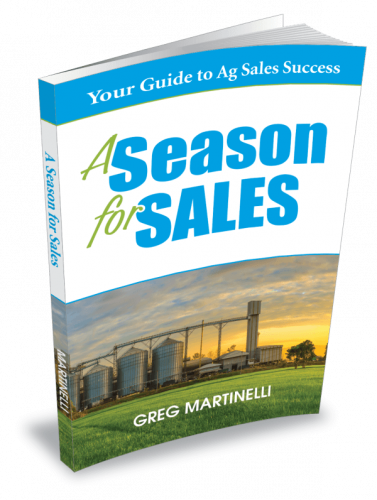Tis the season for following up
As I write this, it’s four days before Christmas. You might think I’m going to recommend that you relax, or maybe even rejoice. Not today!
Right now, I want you to Follow up.
Today, I want you to make a very important step in securing more sales in the weeks and months after the holidays.
Key concepts about Following-up:
- Few sales are made on the first sales call. Very few. We know this to be true, but fail to act on the importance of this step in the selling process: Follow-up
- Most of your competitors are quitting early and, “leaving their customers alone for the holidays”. Great! Less competition.
- Do any of these issues sound familiar in your selling process or in your sales team’s process?
- You send a price quote or proposal but never follow up to see if the customer is interested.
- You send it to the prospect, but we never hear back from them unless they buy.
- “I quote the price and then let them decide”
- You think everyone is a price shopper because they just ask for the price and then buy from someone else.
- “I never know how, when, or how often to follow up. I don’t want to be pushy or annoy my prospect.”
Keep in Mind
Here are some thoughts and maybe a different perspective on possibly the second most important selling skill for the Ag sales professional:
- Remember that sales often require 5-7 or more sales calls to actually get a customer to buy from you. Longer if the prospect has been with their current supplier for years. Longer if trying to switch a red tractor customer to green or blue. Extreme brand loyalty will require more prospecting sales calls. Longer if the prospect truly is happier with their current supplier. Longer if you have no clue how the customer makes their buying decisions.
- The better you are at asking high-value questions, the more reasons you will have to follow up. If you show up and do the typical sales routine of dumping all your features/benefits on your prospect, then you will struggle with follow-up forever.
- This means you need to have a plan when you make a sales call. Write out the key pieces of information you need to uncover on your sales calls. Develop the questions to get that information. Take good notes while on the sales call. Interpret your notes after you get back to your office and plug in key follow-up dates on your Outlook calendar.
Follow-up Levels
We struggle with follow-up for several reasons. The first is that we truly want to follow up but also don’t want to appear pushy, annoying, etc. This leads to far too many Ag sales professionals that err on the conservative side and simply fail at following up. Despite putting in an incredible effort to get the sale and despite being extremely close to making a sale, our salesperson drops the ball at the one-yard line. Employ these follow-up levels to keep the interest level going with your prospects.
- Light Follow-up: This is simply a touch point. These are relationship-enhancing activities. Might be a text, an email, a social media note, or an old-fashioned snail mail letter. The key component to this is that it needs to be personalized. In the light format, it often doesn’t require a reply. It might be, “Jim, I appreciate the opportunity to price out your farm’s software program. Here’s that promotion I mentioned to you. I’ll give you a call next week to discuss it further and how it would work on your farm.” This can and should occur within 24 hours of a sales call. It can continue as appropriate. By appropriate, I mean you have something relevant to say. The more industry activity going on or the more activity going on at that customer’s farm, then the more you can use light follow-up skills. My thought is to not use a phone call in a light follow-up unless that is the only way that prospect will communicate with you.
- Medium Follow-up: This is a touch point but asking for some form of a response. Use the same format of using email, text, or social media format as we did in the light level, but can include a phone call. Now, just add to it by requesting some action on their part. Most often, that is requesting a meeting to discuss it in person, zoom, or by phone.
I feel this is an absolute minimum for any customized price quote. Even if the customer tells you they bought from someone else.
Why? First, you learn why you lost the sale. That information will help you sell against your competitor that got the sale. This won’t be the last farm that you go head-to-head against an entrenched competitor. Learn from your losses so you can win another day. Second, you discover a lot about the way this customer makes decisions. That will help you when trying to sell them again. Very few products are one-time purchases. Your customers have been farming for a long time and will make another purchase. However, the next time, you will be much smarter about how to approach it.
The medium level of follow-up can be done over the phone. You are checking on a specific price quote or maybe you did an on-farm trial with them. So, there is a certain involvement you have with this customer. That level of involvement should justify the opportunity to call them on the phone. For producers, it’s their cell. For Ag buyers, it’s their preferred method of phone call (office or cell). How do you know which they prefer and when? Ask them on the initial sales call. Before you leave any sales call, you should ask, “Hey, I know you’re busy and you get a lot of calls. So, what would be the best time and phone number to reach you?”
- Heavy Follow-up: This is for several key times.
If you put in a considerable amount of time on this price quote or proposal, then a face-to-face meeting is justified. In many cases, these quotes will actually provide consulting advice on how to farm better for your prospect. They might include herbicide, fungicide rotations, and seed recommendations. Or animal health practices, financing alternatives, etc. Providing this type of advice should at least give you the confidence to ask for a deeper discussion than a simple, “No, we went with your competition”.
Another reason for heavier follow-up is when a buying decision is imminent. Early in the selling process, it’s good to establish what the timeline is for the customer when using your products.
My description of heavy follow-up is when you meet and discuss the reasons they made their choice to go with you or your competitor. Important items to obtain in this meeting
- What were the deciding factors?
- Did you truly understand what they wanted?
- How did you get it wrong if you did?
- What will be the measure of success when they use their products?
- When will they obtain those measures?
- When will they go through this decision process again?
- Was there anything missing from their offer that you might provide?
Following up on a Follow-up:
One last thought, “It’s never over…not even when it’s over” Take a break from the intensity of this sale or this proposal process that you have been on with this prospect. Take a month or two-three months. Then, check back in to see if everything is going as planned.
- Did their products perform the way they said?
- Is this prospect achieving the results that your competition promised?
- If not, what is being done and what help could you provide?
Whatever you do, never stop. In a recent sales training workshop, someone asked me, “When do you quit on a prospect and realize it’s a lost cause?” My answer is and always will be, “Never”. I may back off of the intensity. I may not push or strive to call on with as high of hopes. But I never quit on it. If I’m a fit and they are still in business, then I am going to be there.
I’m in it for the long haul, just like they are.
Related article: You Sell on the Follow-up Podcast Version


